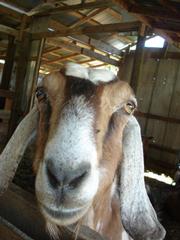LITTLE ROCK — Daisy is the uber-goat, the queen, the undisputed heavyweight champ of Calm & Gentle Farms, and anyone who wanders into her barn is gonna have to sit still for a sniff or get nipped.
But that's all part of the charm of both Daisy and Calm & Gentle. Because chances are, if you've met Daisy, you've bought goat milk. And we mean the real stuff. Raw. Unpasteurized. Straight from the udder. Nothing captures the experience of buying raw milk like standing in a barn, smelling the hay and manure, and meeting Daisy and the rest of the working girls. Now that's what you call all-natural.
Or maybe it's too natural. And there is such a thing, at least according to certain government officials. Not everybody in Arkansas thinks unpasteurized milk should be consumed, much less offered up for sale by the gallon. It seems raw milk can spread a whole nasty gamut of diseases. Like, say, tuberculosis. Or diphtheria. Or polio, typhoid fever, salmonella, and so debilitatingly on. Which explains why the state Department of Health opposes a law allowing goat farms like Calm & Gentle to sell up to 100 gallons a month of unpasteurized milk, and why the department defeated a bill before the Legislature this year that would've extended a similar quota to makers of raw cow milk.
Just take it from Ed Barham, a department spokesman: "The agency's opposition to the consumption of raw milk mirrors that of the U.S. Food and Drug Administration, Centers for Disease Control, the World Health Organization, the American Academy of Pediatrics and many more agencies and organizations ..."
But a good number of folks in Arkansas want their milk raw. Some are allergic to pasteurized milk, says Nao Ueda, a natural-foods activist in Little Rock who supported the bill to allow small sales of raw cow milk. Others just like the taste or note that it's much harder to make fresh cheese from pasteurized, store-bought milk. And some of a more libertarian bent just plain resent the government telling them what they can and can't eat.
Raw milk drinkers note that 27 other states - including some of Arkansas' neighbors - allow small-scale sales of raw cow milk. They also note that for much of Arkansas' history, unpasteurized was the only flavor of milk available to Arkansans. And that, regardless of the state's Department of Health, raw milk can be had for those looking to buy it.
The milk bottle was labeled as pet food, but Ueda poured a glass of it, offered a dollop of chocolate syrup, and we drank it down all the same. It was thick, whole milk, and fresher than anything you'd get from a store. It tasted like, well, milk. With a slight aftertaste that can only be described as ... raw.
"They sell it to me as pet milk and I drink it," Ueda said. "I'm doing it, not them. But there is no law against people consuming raw milk."
That's one way around the law. Another is buying a share of a milk cow, Ueda said. You pay for a share of the animal and the cost of upkeep in return for a portion of the raw milk that results. Or you can just drive to Texas, Missouri or any other state where raw milk can be legally sold. The law, Ueda said, is "not a big problem for raw milk drinkers. We'll find a way of getting ahold of it."
The easiest way to get raw milk in Arkansas is to settle for goat milk. Web sites like http://www.realmilk.com/ contain listings of local producers with goat milk for sale. It's a local business, a matter of a few dozen goat farmers across the state who produce and sell milk more as a hobby than a source of cash. Or so says Karen Bailey, the owner and operator of Calm & Gentle Farms. As she put it: "It's not a business because businesses are supposed to make money."
"They are livestock, but they cross the line into pets," Bailey says as she introduces a visitor to a pen full of squirming, crying and ridiculously cute baby goats. "Basically, I've got a bunch of pets."
But buyers come from as far away as Jonesboro to buy both goats and milk, Bailey said. They can come see how she handles the animals and milk, meet Daisy and the girls, even watch a milking if they want. Bailey produces about 10 gallons of milk a day, most of which she either feeds to baby goats or uses to make cheese, yogurt, butter or soap for her family.
She sells the milk at $7 a gallon. It's something Bailey has been doing for a dozen or so years, an extension more of her love of animals than anything else. But in the last few years, as more food lovers and environmentalists have taken to eating local foods, the fresher the better, she's seen a boom in interest for raw goat milk.
"In the last five years, everybody has jumped on the bandwagon," Bailey said. "It's raw and local, local and fresh."
And after taking a gallon home to dribble into the morning coffee or pour over the Cheerios, you can also add - raw goat milk is pretty tasty, too.
